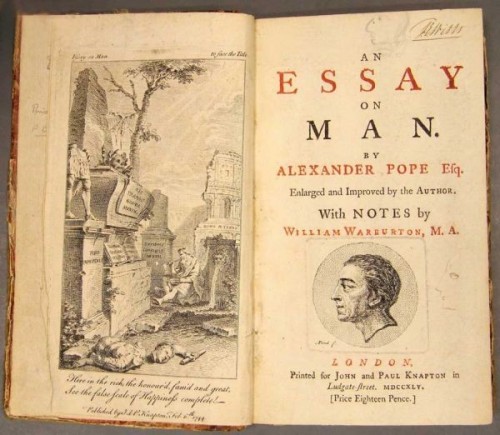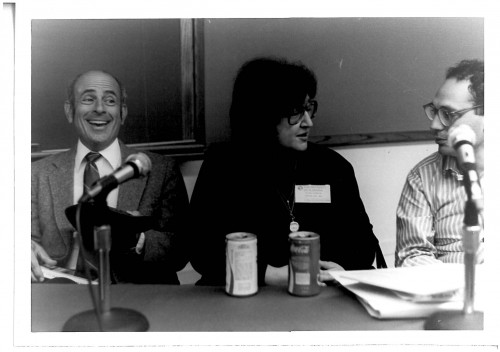Quasi-unintelligibility (Part 1)

Seven years ago this month Helen Vendler published one of my favorite of her books, Poets Thinking. In particular I love its chapter on Alexander Pope, which starts off by recounting the frustration and dismay Vendler experienced while taking part in a symposium of academics brought together at Harvard in the early 80s to discuss Pope’s long “philosophical” poem, An Essay on Man. The participants in the symposium (a philosopher, a political scientist, an anthropologist, and Vendler herself) each approached Pope’s poem through the principles and methods of his or her own discipline, which sounds reasonable enough in the abstract, but in practice, what it appears to have amounted to was that each of their responses to An Essay on Man (with the exception of Vendler’s, of course) critiqued the 300-year-old poem’s intellectual content without any reference to the manner in which that content was presented. Unsurprisingly, the philosopher, the political scientist, and the anthropologist all determined that content to be passé and problematic, relegating the poem to what Vendler calls “outdated cultural detritus.” Pope’s superhuman powers of expression—his unrivaled formal dexterity and dizzying inventiveness—evidently meant nothing to the other symposiasts, who instead chose to debunk the poem’s received Enlightenment ideas, many of which only the most insensitive or unseasoned reader of poetry could fail to discern that Pope himself was making light of, destabilizing, upending, distorting, and otherwise giddily taking down a notch in the poem.
But presumably Vendler was the only serious reader of poetry among the participants in the symposium, or else maybe the others present felt it would be more appropriate to leave it to the English professor to discuss the poem qua poem. In either case, the experience of watching these otherwise intelligent, principled people discrediting such a massive literary achievement as An Essay on Man on blatantly extra-literary grounds, i.e., because of the non-currency of the ideas presented in it, troubled Vendler into thinking she might one day write about the status of ideas in poetry, including how, as in Pope’s case, the manner in which an idea is presented in a poem can itself imply a complex critical relationship to that idea. Almost a quarter of a century later, Vendler published Poets Thinking: Pope, Whitman, Dickinson, Yeats.

As with any book, there are parts of Poets Thinking that I gravitate to more strongly than others, pages I turn to more frequently. First among these is the passage in which Vendler discusses a quality she has come to suspect Pope is in pursuit of throughout his inspired rehash of Christian empiricist thought—a quality in addition to the conventionally sought-for memorableness and concision, which Pope himself explicitly professes to be after in An Essay’s preface. The term for this other, unacknoweldged quality, Vendler fears, is “quasi-unintelligibility,” the achievement of which she supposes delights the poet as a way of achieving “revenge on the moribund encapsulation of received ‘ideas’ and on the characteristically flat rhetoric by which they are [in contemporary prose treatises] expounded.”
When I first read this passage it seemed to me that something I had long felt and valued were finally being articulated. For as long as I can remember I’ve been sensitive to the distance between an object of thought or perception and any given way of expressing it, knowing that the most efficient, utile, or commonplace way of putting it might be appropriate for the daytime, so to speak, or in the marketplace, but at night, and in the forest, all bets were off—or else they should be. A sharpened pencil might become “a stick of gold with lead in it, excited to a point.” A glass of ice water might transform into “a liquid clearness contained in a slower liquid clearness, interrupted by solids of the first clearness.” And somehow, sometimes, to re-conceive the near-at-hand in a way surpassing that in which routine and its dry tongue compels one to experience it has seemed like more than just recreation or refreshment—it has felt like a necessary refusal, a saving mutiny.
These examples might suggest that prolixity is the surest way to achieve quasi-intelligibility, but I think its riddling effect can be produced by other means as well, including metaphor, syntactical and lexical high-spiritedness, pronounced sound patterning, parataxis—pretty much anything that serves to complicate the uptake, slow the flow, and draw attention to the language itself before that which it indicates. The idea isn’t to break from reference altogether, I don’t think, but to soar far and forcefully away from the workaday rendition of things, to flee from the “characteristically flat rhetoric” you often feel the world wanting to pen you in, but to do so without snapping the chain that prevents you from attaining orbit, the tether that keeps you able to ask for a donut when you want one.

There are other words for it, other ways to think about the habit of poetry, or of much of the best poetry, to present itself, at times, as quasi-unintelligible. I think the “torturous speech” that revivifies what habituation has deadened from our experience—the “making strange” that Shklovsky advocates for in his essay “Art as Technique”—isn’t all that different from the quasi-unintelligible. I think when poetry leads us into states of unknowing comfortably, as Keats discusses in his celebration of negative capability, or ecstatically, as through Rimbaud’s “dérèglement de tous les sens,” it doesn’t lead us too far afield from the quasi-unintelligible. And when Wallace Stevens writes, in “Man Carrying Thing,” that “The poem must resist the intelligence / almost successfully,” he must mean it should be quasi-unintelligible. He also seems to suggest that the shifting, indeterminate particulars of a work of art, as for example a “brune figure” walking through a sudden snow storm, or even the storm itself, or the “horror of thoughts” we endure “all night” as the storm rages on, will only begin to add up when we experience them from a cooler remove, as parts of a whole, as in the morning after, when “The bright obvious stands motionless in cold.” But I’ll put off considering “Man Carrying Thing” more closely until my next post.
Timothy Donnelly is the author of the poetry collections Twenty-seven Props for a Production of Eine...
Read Full Biography

